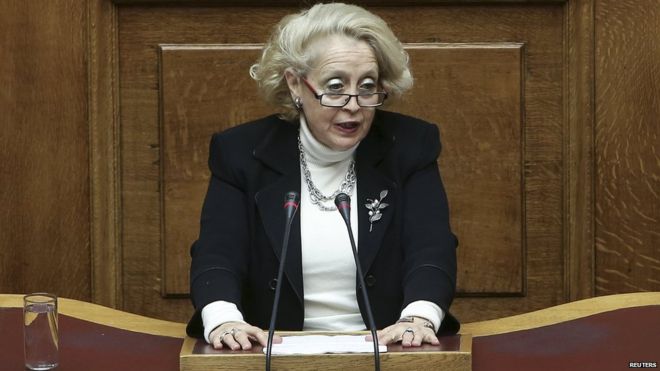Supreme Court Judge Vassiliki Thanou Appointed As Caretaker PM
Vassiliki Thanou, top Supreme Court judge of Greece, was appointed caretaker prime minister as the country prepares for elections next month after the resignation of Alexis Tsipras. The appointment ended a political deadlock that lasted a week following the resignation of Tsipras. Thanou and the interim government will remain in power until elections are held on September 20.
Tsipras said he was happy to receive the first woman prime minister of Greece and it is a significant step in the history of the country. Thanou opposed austerity measures that reduced wages of judges and other court officials.
The appointment of Vassiliki Thanou ended a week of useless negotiations as opposition leaders exercised a constitutional right in trying to form a government. The process starts after the resignation of a prime minister within a year of election. The main conservation opposition started the process before the far-left Popular Unity party took its turn in an effort to delay the election.
The conservatives indicated that it was necessary to avoid an election that was not needed by Greece. Greece is currently working on implementing austerity measures required under an agreement with creditors for the 86 billion euro bailout. The country also has to manage an extraordinary influx of migrants.
Vassiliki Thanou said the duties of the caretaker government are mainly holding fair and smooth elections. But, with the current situation, it will be necessary for the government to deal with a number of crucial issues, including immigration. While the names of the ministers of Vassiliki Thanou will be officially revealed on Friday, Greek media indicated that George Chouliarakis will likely be named interim finance minister. Chouliarakis is a senior official in the debt negotiating team of Greece.
Panagiotis Lafazanis, leader of the Popular Unity, used his three days in trying to form a government by airing his anti-bailout message. The Popular Unity party broke away from the Syriza party of Alexis Tsipras last week. Even though Tsipras accepted the bailout program, he continues to be popular in Greece. Opposition parties think it was necessary to have a longer campaign period to reduce his popularity as austerity measures start to kick in.
While Syriza is expected to become the biggest party in the parliament once the elections are held, Tsipras may not achieve absolute majority. If Alexis Tsipras is unable to get a coalition partner, a second round of elections may be held. Tsipras said his party will not work with Socialist PASOK and New Democracy, which ruled Greece before the emergence of Syriza.
He also dismissed the possibility of working with centrist To Potami party, which limited his options for a potential ally to the Independent Greeks. Tsipras said they have considerable differences with the other three parties since they reflect the old party system. He added that he will not become the prime minister.
The statement of Alexis Tsipras drew criticism from the opposition, who accused the resigned prime minister of telling voters that they will have to deal with a situation to either choose his party or cope with a political deadlock. To Potami leader Stavros Theodorakis said Alexis Tsipras provoked citizens indicating that he will not cooperate to their vote. Theodorakis added it essentially means another round of elections will be held in October if the Independent Greeks are not elected into parliament.
